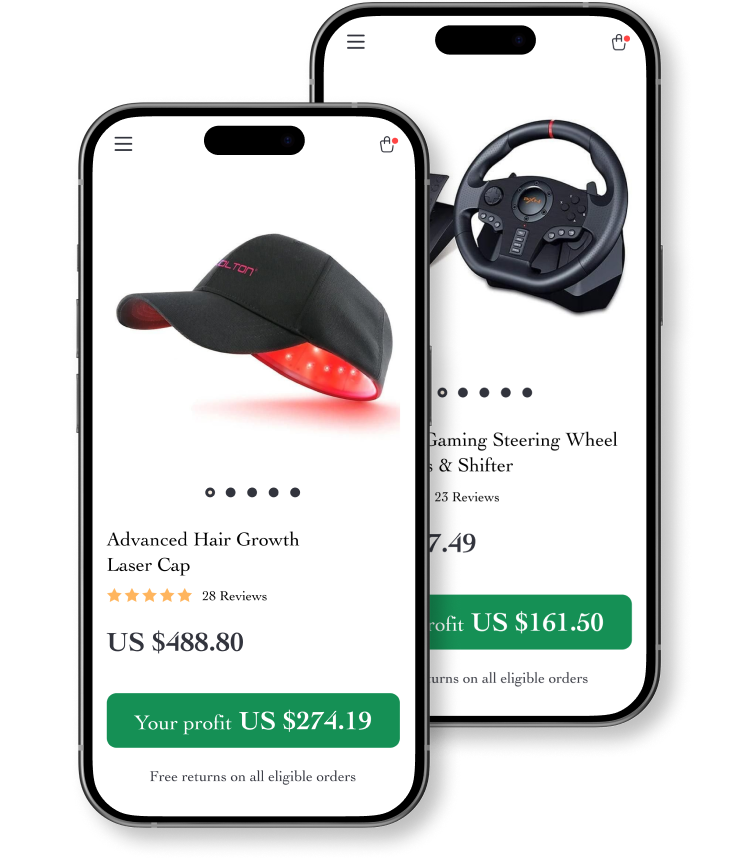The Complete 2025 Guide to Buying an Ecommerce Business: What to Know Before You Invest

According to the Small Business Index 2025, optimism among American entrepreneurs has reached a record high. More than 60 percent of small-company operators report positive expectations for the year ahead. That is a clear sign that the U.S. startup climate is healthier than it’s been in years. But launching something entirely new still demands time, testing, and upfront costs. That’s why an increasing number of people are choosing a different route and buy an ecommerce business that already has a foundation, audience, and cash flow.
All for $0 when you act here and now!
100 TikTok best-sellers
Digital commerce offers an attractive mix of accessibility and potential. Instead of spending months developing a concept, new owners can step straight into management, refine operations, and start earning from day one. This guide explains why online ownership continues to outperform traditional retail, what to look out for, and how to make confident, data-driven decisions along the way.
[table_of_contents]
Why ecommerce is often superior to buying an offline business
Buying an offline business can still work as restaurants, small retail stores, and service providers remain important pillars of the local economy. But when you look at scalability, risk, and long-term growth, ecommerce consistently outperforms traditional models.
Lower barriers and higher margins
A physical store requires significant fixed costs: rent, utilities, staffing, insurance, and inventory storage. In contrast, a digital store can operate with up to 70% lower overhead, according to data from the U.S. Small Business Administration. You can run it from anywhere, automate many functions, and reinvest saved capital into marketing or product development.
Moreover, profit margins in ecommerce average 35 – 40%, compared to 10 – 20% in typical retail. That difference is largely due to reduced operational costs and the ability to reach global audiences without geographic constraints.
Scalability without the pain
Scaling an offline business often means physically expanding: leasing more space or hiring more staff. Online, you scale by upgrading your platform, adding new product lines, or increasing ad spend. You can test new niches quickly and adapt based on performance data rather than long-term leases.
Many ecommerce entrepreneurs use subscription models, dropshipping, or print-on-demand, each allowing you to increase volume without proportional growth in expenses. That flexibility simply isn’t possible offline.
A lifestyle aligned with modern work
Digital ownership fits the modern entrepreneur’s reality: flexible hours, remote management, and data-driven decision-making. You’re not tied to a single location or schedule and that makes ecommerce especially attractive to people seeking independence or a side business that can grow into a full-time income.
An expanding market
According to Statista, U.S. ecommerce sales surpassed $1.1 trillion in 2024, up 9.4% from the previous year and projections show steady growth through 2028. Consumer habits continue to shift online, and platforms like Shopify, Amazon, and WooCommerce have made digital selling accessible to almost anyone. This means that an ecommerce business for sale today has built-in demand and market momentum behind it.
Offline business models, by contrast, face growing operational pressures: higher rent, labor shortages, and local market saturation. While they can still be profitable, their scalability is limited.

What makes ecommerce a good investment
When you decide to buy an ecommerce business, you’re stepping into an ecosystem that can generate recurring income, scale globally, and grow in value over time. Unlike traditional assets, online stores are dynamic, data-driven, and deeply adaptable to market trends. Let’s look at what makes it a particularly strong investment in today’s economy.
Steady growth
Ecommerce continues to be one of the fastest-growing segments of the global economy. Even as other industries experience fluctuations, online sales have shown steady year-over-year growth for more than a decade. Consumers have shifted their habits permanently toward digital shopping: from household goods to specialized niche products.
For an investor, this means one thing: the potential market keeps expanding. When you buy an ecommerce business, you’re entering a space that still has room to grow and evolve, even in competitive categories.
Predictable revenue and data transparency
Unlike many offline businesses where performance can be hard to measure, ecommerce gives you access to real-time analytics: sales history, conversion rates, customer retention, and traffic sources.
This transparency allows you to forecast income and identify opportunities with precision. A well-structured online store with consistent monthly revenue is often easier to evaluate than a brick-and-mortar shop whose performance depends on foot traffic or local conditions.
High profit margins and flexible cost structure
Ecommerce models often operate with leaner cost structures. There’s no rent for physical locations, smaller teams, and automated logistics. This results in higher margins and more control over where the money goes.
Additionally, modern ecommerce models, such as dropshipping, print-on-demand, or digital product sales, can generate income with minimal upfront inventory costs. That flexibility allows entrepreneurs to start small and grow sustainably without massive capital commitments.
Scalability built into the model
One of the strongest arguments for ecommerce investment is scalability. Expanding an offline store often means physically opening new locations, while expanding online can be as simple as adding new products, launching into new markets, or running targeted ad campaigns.
That’s why many investors prefer acquiring ecommerce businesses for sale with existing traction, because they can focus on scaling what already works rather than reinventing the wheel.
All for $0 when you act here and now!
100 Instagram best-sellers
Multiple monetization options
An ecommerce operation doesn’t have to rely on one source of income. Beyond direct sales, owners can earn through affiliate partnerships, digital ads, brand collaborations, and subscription programs.
This diversity makes online stores resilient even during market slowdowns. If one product category drops, others can compensate, and that flexibility protects your long-term investment.

Easy exit opportunities
Finally, ecommerce assets are liquid compared to many offline businesses. If you build value through brand recognition, steady sales, and customer loyalty, you can resell your store at a significant multiple of its monthly revenue. Platforms dedicated to ecommerce businesses for sale make this process smoother, allowing investors to cash out or diversify when the time feels right.
Online stores combine the accessibility of digital entrepreneurship with the profitability and flexibility of a long-term investment. For modern entrepreneurs who value both independence and growth potential, few assets offer a better mix of reward and control.
What to watch for before you buy
Buying a ready-made ecommerce business comes with potential pitfalls. Here are some of the most popular ones.
Traffic stability
If most visitors come from one paid-ad source, revenue could drop the moment campaigns stop. Healthy ventures draw traffic from multiple channels — organic search, returning customers, and social media.

Real profit vs. gross numbers
Many listings highlight total sales without showing what’s left after expenses. Focus on net income and consistent month-to-month performance, not isolated spikes.
Supplier reliability
A single unreliable supplier can jeopardize operations. Confirm that product sources are legitimate, prices stable, and contracts documented.
Customer retention and brand reputation
Check repeat-purchase rates and online feedback. Strong engagement signals trust — a vital factor for long-term success.
Operational complexity
Some online stores demand full-time attention, while others are nearly automated. Make sure daily workload fits your lifestyle and skill set.
Legal and compliance checks
Verify ownership of intellectual property, domain names, and images. Confirm that the store meets privacy and tax regulations before you proceed.
By approaching due diligence methodically, you can filter out risky options and focus on sustainable, verifiable ventures.
Where to find stores for sale
Once you’ve decided to enter the digital marketplace, the next step is to find a reliable place to explore ecommerce businesses for sale. There are many online platforms where sellers list their stores: from small niche projects to seven-figure operations. Each platform has its own focus, verification process, and audience.
Here are some of the most notable marketplaces where you can buy an ecommerce business today:
1. Offiro
A curated platform offering ready-made online stores built for immediate operation. Each listing includes a complete setup, supplier integration, and marketing dashboard. Offiro emphasizes transparency and gives buyers a 14-day trial to explore how each store performs before purchase.
2. Flippa
One of the largest open marketplaces for digital assets including websites, digital stores, SaaS apps, and domains. Flippa allows anyone to buy or sell a store directly, with public bidding and valuation tools.
3. Empire Flippers
A brokered marketplace focusing on established, revenue-generating businesses. Listings are verified before going live, and the platform offers assistance with migrations and escrow handling.
4. SideProjectors
A community-driven space where creators list smaller side projects, including ecommerce stores, apps, and digital tools. Ideal for investors looking for creative or early-stage online ventures.
5. Niche Investor
Specializes in content and affiliate-based businesses. Each listing is vetted for profitability and performance before publication.
6. Motion Invest
Targets small to mid-size online businesses with consistent income history. Known for simplified evaluations and direct transactions between verified buyers and sellers.
7. Business Exits
Caters to owners who want to sell established companies. The platform focuses on matching entrepreneurs with qualified buyers and managing the entire exit process.
8. Latona’s
Offers listings across multiple digital categories: ecommerce, SaaS, affiliate, and lead-generation businesses. The company has a long history in digital brokerage and emphasizes confidentiality during negotiations.
9. Acquire.com
Formerly known as MicroAcquire, this platform connects startup founders with potential buyers. It covers SaaS, ecommerce, and DTC brands, providing valuation insights and secure deal rooms.
10. BuySellEmpire
Features a mix of dropshipping stores, Amazon FBA businesses, and content sites. It includes due-diligence reports and financing options to simplify purchases.
11. BizBuySell
One of the largest general business-sale platforms in the U.S., listing both physical and online companies. It’s often used by investors looking to compare offline and online opportunities in one place.
12. FE International
A global mergers-and-acquisitions advisory firm specializing in high-value ecommerce and SaaS deals. FE International handles full-service brokerage, from valuation to closing support.

Why Offiro Stands Out
Among these marketplaces, Offiro takes a slightly different approach. Its focus is on safety, security, and speed — three elements that simplify ownership and protect buyers from hidden risks.
Safety means full transparency. During your 14-day trial, you can explore the “behind-the-counter” view of your future store: sales data, customer activity, delivery times, and supplier performance. You see exactly how the shop operates before any commitment — ensuring there are no surprises once the purchase is made.

How to find the venture that fits
Not every online project aligns with every owner. The best choice reflects your goals, experience, and available time.
Clarify your motivation
Decide whether you want a part-time source of income, a full-scale brand, or an asset you can later sell. Each objective calls for a different type of store.

Pick the right model
- Dropshipping suits those who prefer automation and low risk
- Print-on-demand fits creatives who value design freedom
- Private label or DTC works for long-term brand builders
- Affiliate or hybrid models reward marketing expertise
Platforms such as Offiro help filter listings by model and niche, so you can match them to your working style.
Study the niche
Numbers matter, but understanding the audience matters more. Choose an area where you can recognize trends, speak your customers’ language, and maintain enthusiasm over time.

Evaluate manageability
Consider your availability. Some stores require hands-on marketing, others can run with minimal oversight. Automation and outsourcing can lighten the load if needed.
Think long-term
A good online operation should evolve with the market — leaving space for new products, rebranding, or expansion into other regions.
All for FREE when you act here and now!
25 new weekly best-sellers
What to do before making the big decision
Buying an online business is both exciting and serious: it’s a move that can reshape your financial and professional life. But before you sign anything, it’s crucial to step back and make sure the opportunity you’re considering is truly what it appears to be. A few hours of structured preparation can save you months of frustration later.
Understand the store inside out
Every listing for ecommerce businesses for sale will highlight revenue, traffic, and potential, but those numbers only tell part of the story.
Go deeper:
- Ask for analytics access (Google Analytics, Shopify dashboard, etc.) to verify real traffic and conversion data
- Review historical performance over at least the last 12 months. Look for consistent growth, not sudden spikes
- Check where customers come from: stable organic search traffic is a positive sign; dependence on one ad channel can be risky

Built-In Security and Expert Support
Another defining advantage of Offiro is its emphasis on security. Every store operates on the Selvia platform, optimized for stable performance, fast delivery, and effortless scaling. You’re stepping into a tested infrastructure with expert support available whenever you need it.
As your venture grows, you can also connect with Offiro’s marketing services for tailored campaigns, audience analytics, and conversion optimization.
All for FREE when you act here and now!
Check financial health
Before you buy an ecommerce business, verify its financials the same way you would for any serious investment. Review profit and loss statements, ad spend, refunds, and operational costs.
Pay attention to:
- Gross and net margins
- Customer acquisition cost (CAC)
- Average order value (AOV)
- Monthly recurring revenue (if applicable)
A store with solid but steady profits is often a safer buy than one with rapid, unsustainable growth.
Evaluate the operations
Know what running the business will look like day to day.
Ask yourself:
- Who handles fulfillment and customer service?
- What software tools does the store use, and are they included in the sale?
- How much time will it require from you each week?
Platforms like Offiro simplify this step by showing operational details in each store listing, from logistics partners to marketing automations, giving you a clear picture of what you’re actually buying.
Research the niche and market trends
Even a strong business can lose ground if the niche itself is shrinking. Study current demand, emerging competitors, and seasonal factors. Use tools like Google Trends or keyword analysis to see if consumer interest is growing.
If you understand the market forces behind your chosen store, you’ll be better equipped to steer it in the right direction after purchase.

Perform legal and technical due diligence
Make sure the store’s intellectual property (domain, logo, photos, product descriptions, and supplier contracts) legally belong to the seller.
Check for:
- Trademark or copyright conflicts
- Active licenses or platform agreements
- Customer data privacy compliance (GDPR, CCPA, etc.)
- Secure payment integrations and updated SSL certificates

If you’re not confident handling this yourself, hiring a legal or digital due-diligence expert can be a smart investment.
Prepare for ownership transition
Finally, have a clear plan for what happens right after the sale. Discuss migration details, platform access, supplier introductions, and knowledge transfer.
A smooth transition ensures you can start operating immediately without disruptions to customers or sales.
How to grow your new store
Buying a ready-made store is only the beginning. Growth comes from consistent attention, smart optimization, and knowing where to focus your energy. However, most improvements don’t require radical change, just data, strategy, and patience.
Focus on the customer
Growth starts with understanding your audience. Use feedback, reviews, and purchase data to identify what customers value most. Refine your offers, simplify navigation, and improve post-purchase communication. Loyal customers are always cheaper to retain than new ones to acquire.

Strengthen your marketing mix
Diversify how people find you. Relying on one ad channel limits growth and increases risk. Balance paid ads with SEO, social media, email campaigns, and influencer collaborations.
Platforms make this easier by offering integrated marketing dashboards, so you can track and adjust your efforts from one place.
SPECIAL OFFER
Get your free store + 1,200 holiday products & design!
Boost your sales this Christmas!


Optimize and automate
Audit your operations regularly. Streamline order fulfillment, automate repetitive tasks, and integrate tools for inventory, analytics, and customer support. The less manual work your business needs, the faster it can scale.
Reinvest in what works
Monitor performance monthly and reinvest profits into the most effective areas, like high-converting ads, customer retention programs, or expanding successful product lines. Consistency compounds over time.
Fast, Transparent, and Designed for Growth
Speed matters too. Offiro’s buying process is streamlined and fully transparent: from selecting a store to securing ownership, every step is optimized to take days, not weeks. You can even pay in installments, structuring payments around your store’s profits.
Once the plan is complete, ownership is transferred securely through a legally verified process, so you can focus on running and growing your new venture from day one.

Frequently asked questions
1. What’s the safest way to buy an online business?
Use trusted marketplaces that provide verification, escrow, and migration support. Platforms like Offiro, Empire Flippers, and Flippa ensure that funds are held securely until both sides complete the transaction. Avoid private deals without proper documentation or ownership transfer guarantees.
2. How long does it take to start earning after purchase?
If the store is already active and traffic continues as usual, you can often start generating sales from day one. However, it may take several weeks to understand operations, adjust marketing, and optimize performance for higher margins.

3. Do I need technical skills to manage an ecommerce business?
Not necessarily. Most modern stores are built on user-friendly platforms like Shopify or WooCommerce. You can manage inventory, orders, and marketing from an intuitive dashboard, and hire freelancers for technical tasks if needed.
4. How can I tell if a business is truly profitable?
Request financial records, analytics access, and proof of transactions. Compare sales data with ad spend and recurring costs to calculate true net profit. Reliable marketplaces usually verify these details before listing.
5. What are the biggest mistakes first-time buyers make?
Rushing into a deal without due diligence, underestimating workload, or relying solely on seller claims. Always review traffic sources, customer data, and profit consistency and don’t hesitate to consult experts before closing the deal.
6. How do I grow the store after purchase?
Start by improving what already works: optimize ads, expand winning product lines, and refine customer experience. Small, steady optimizations often create the biggest long-term gains.
7. What’s the future of ecommerce investment?
The sector continues to grow and diversify, with more tools, niches, and automation opportunities appearing every year. As digital commerce becomes increasingly integrated into everyday life, owning an online business is evolving from a side project into a mainstream investment path.
Explore Offiro today and see how easily your entrepreneurial journey can begin.















